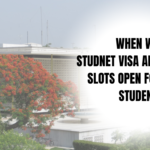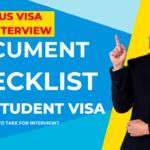Preparing for a U.S. student visa interview can be a daunting task, but with the right preparation, you can approach it with confidence. This guide covers the most common types of questions you may encounter during your F1 visa interview, along with tips on how to approach them.
A. University and Course-Related Questions
Visa officers want to ensure that you have a clear understanding of your chosen university and program. Be prepared to discuss:
- Your choice of university and specific program
- How the program aligns with your academic and career goals
- Details about the university’s location, faculty, and campus
- Your research process in selecting the university
- Comparisons with other universities you may have applied to
- Which university are you going for?
- Why that university?
- Why did you choose this specific program over similar programs at other universities?
- How does this university’s program align with your academic and career goals?
- Tell me something about the state in which that university is located.
- Tell me the nearest airport from your university.
- Tell me about the professors.
- What do you know about the faculty of your department (e.g., Computer Science)?
- Programs that your university launched recently?
- Can you tell me about the university campus?
- What research have you done about the university?
- How did you learn about this university?
- How many universities have you applied to and how did you apply to them?
- Did you get I-20 from all of these universities?
- Why don’t you choose other universities?
- Why did you change your university (if applicable)?
- Where is your university located?
- What do you know about the city where the university is located?
- Why is this program important to your future career?
- What is the duration of your course?
- Describe your course curriculum.
- How many credits does your course have?
- Have you been awarded any scholarships or financial aid?
- How did you get this scholarship?
- What are your plans while staying in the USA?
- Are you planning to pursue additional education after completing your current program?
- Do you know any professors in this university?
- What do you know about their research?
- Why not the same course in your home country?
- Can you explain why you chose this specific location in the United States?
Tip: Thoroughly research your chosen university and program. Be ready to articulate why they are the best fit for your academic and career aspirations.
Check out “What Documents are required for F1 Visa Interview?”
B. Major/Subject-Related Questions
Expect questions about your chosen field of study:
- Explanation of your major and its uniqueness
- How your major relates to your career goals
- Your academic background in relation to your chosen major
- Any projects or experiences related to your field of study
- Which major are you going to pursue?
- Why did you choose that major?
- Tell me something unique about that major.
- Explain your major.
- How is your major related to your career goal?
- Why not a Bachelor in another major instead of your major?
- Did you have any subjects related to your course in high school?
- When did you develop an interest in this major?
- Did you do any projects related to your course?
Tip: Be passionate when discussing your major. Demonstrate a clear understanding of how it fits into your long-term plans.
C. Academic Background and Performance
The visa officer will likely inquire about your academic history:
- Your high school GPA and any improvements over time
- Standardized test scores (SAT, GRE, TOEFL, etc.)
- Your preparation methods for these tests
- Plans for improving English proficiency, if necessary
- Tell me something about your academics.
- What was your 11th GPA?
- What was your 12th GPA?
- Why did you get a low score in your 12th?
- How did you improve your GPA in 12th?
- How many attempts have you given till now (for visa, exams, etc.)?
- What changes have you made this time (in academics or applications)?
- What have you accomplished in 2024?
- How did you prepare for your standardized tests (e.g., TOEFL, GRE, SAT)?
- Why didn’t you give SAT (if applicable)?
- What was your SAT score (if applicable)?
- How did you prepare for the SAT?
- Break down your scores (Math, English, etc.).
- What was your EPT score?
- How did you prepare for the English proficiency test (EPT)?
- How are you going to improve your English?
Tip: Be honest about your academic performance. If there were challenges, explain how you’ve overcome them and your plans for future success.
D. Financial and Sponsorship Questions
Demonstrating financial capability is crucial:
- Total cost of attendance and any scholarships received
- Information about your sponsors and their occupations
- Plans for covering living expenses
- Contingency plans if financial circumstances change
- What is your total cost of attendance after the scholarship?
- How much scholarship did you get from this university?
- Who are your sponsors?
- What do your sponsors do?
- How much does your course cost?
- How will you cover your living expenses while studying?
- Are you sure your sponsors will fund your studies for the whole duration?
- How many employees and what are their salaries (if applicable to sponsor)?
- Do you think your parents will be able to sponsor you?
- What will you do if your sponsor is unable to continue funding your education?
Tip: Be prepared with detailed financial information. Ensure you can clearly explain how your education will be funded for the entire duration of your program.
E. Family and Personal Background
Visa officers may ask about your family situation:
- Information about your parents and siblings
- Any relatives in the U.S. and their occupations
- Your family’s ability to support your education
- Tell me about your family.
- Do you have any relatives in the USA?
- What do they do?
- What do your parents do?
- Do you have any siblings?
- What does your sibling do?
- Why does your sibling not want to go abroad, but you do?
- Can your parents afford to pay both your fees and your sibling’s fees (if applicable)?
Tip: Be concise but informative when discussing your family background. If you have relatives in the U.S., be clear about your intentions to return home after studies.
F. Visa-Related and General Questions
Be ready to address:
- Your reasons for choosing to study in the U.S.
- Your understanding of F1 visa rules
- Your plans after graduation
- How you’ll handle potential challenges in the U.S.
- Why do you want to study in the USA?
- Why the USA over other countries?
- Why an F1 visa instead of other visa types?
- Have you traveled outside your home country before?
- Have you ever filled out a DV lottery?
- What are your plans after graduation?
- Will you return to your home country after your studies?
- What will you do if you face discrimination in the USA?
- How will your degree help you in your career?
- How will your education in the USA benefit your home country?
- What will you do if you face legal issues or emergencies while studying in the USA?
- What is your plan if your visa application is denied?
- Have you ever been denied a visa to the USA or any other country?
- Have you ever been convicted of a crime?
Tip: Emphasize your intention to return to your home country after completing your studies. Demonstrate your understanding of visa regulations.
G. Living and Adaptation Questions
Prepare to discuss how you’ll adjust to life in the U.S.:
- Your accommodation plans
- Strategies for adapting to cultural differences
- How you’ll handle homesickness and academic pressure
- Your plans for extracurricular activities
- Where will you stay during your studies (on-campus/off-campus)?
- If off-campus, do you have accommodation arranged?
- What are you expecting to learn while staying on-campus?
- How will you adapt to cultural diversity in the USA?
- How will you cope with homesickness?
- How will you handle the cultural differences in the USA?
- How will you adapt to the weather in the USA?
- How do you plan to integrate into American culture while maintaining your own cultural identity?
- How will you contribute to the student or academic community at your university?
- What will you do during your spare time while studying in the USA?
- What activities do you plan to participate in outside your academic program?
- How will you handle academic pressure and rigorous coursework in the USA?
- What do you think will be your biggest challenge in the USA?
- How do you plan to stay focused on your studies while being away from home?
- How will you keep in touch with your family while studying abroad?
Tip: Show that you’ve thought about the challenges of living abroad and have plans to overcome them while focusing on your studies.
H. Extracurricular and Career Goals
Be ready to talk about:
- Your hobbies and interests
- Long-term career goals
- How you plan to contribute to your home country after graduation
- Any plans for gaining work experience in the U.S. after graduation
- What are your hobbies?
- What extracurricular interests do you have?
- What are your plans during summer vacation?
- Are you planning to work part-time for living expenses?
- What are your long-term career goals?
- How do you plan to contribute to your home country after graduation?
- Do you plan to work in the USA after graduation for experience?
- How will you prove to the consulate that you will return to your home country after completing your studies?
- Can you provide a detailed plan for your career path after graduation?
Tip: Clearly articulate how your U.S. education fits into your broader career plans and how it will benefit your home country.
I. Miscellaneous Questions
Be prepared for unexpected questions about:
- Recent activities or current events
- Your New Year’s resolutions
- Details about your I-20 and passport
- Tell me something unique about your intended major.
- What did you do during your gap year (if applicable)?
- What have you done this morning or yesterday?
- What do you always do in your free time?
- What is your New Year’s resolution this time?
- When was your I-20 issued?(The one you are using on the interview)
- When will your passport expire?
Tip: Stay calm and answer honestly. These questions are often meant to assess your English skills and general awareness.
Conclusion
Remember, the key to a successful visa interview is preparation, honesty, and clarity. Practice your responses, but avoid memorizing them word-for-word. Speak naturally and confidently, and don’t be afraid to ask for clarification if you don’t understand a question.
Lastly, be sure to review the rules of the F1 visa and be prepared to explain why you should be granted a visa. Good luck with your interview!








Comments are closed.